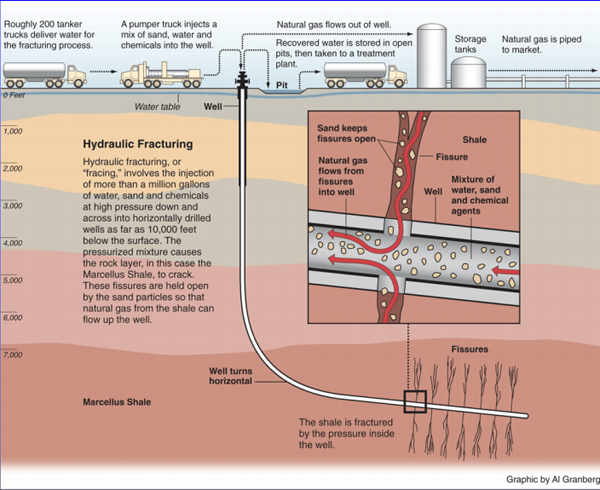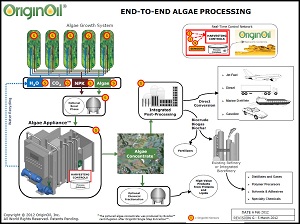Algae technology cleans up fracking

Tainted water that’s used in oil and gas drilling could be treated on-sight, reducing costs and limiting environmental risk.
Safer fracking may be possible. Biofuel start-up OriginOil has devised a new process to treat water that’s been tainted by gas and oil drilling, reducing production costs and limiting environment harm.
A noxious brew of chemicals, mineral, or petroleum, mixes with drilling water whenever oil and gas companies use a drilling technique called hydraulic fracturing, or “hydro-fracking.” This waste is typically pumped out and trucked off to disposal wells for storage, or is eventually treated.
The industry’s term for the brew is “flowback water”, and it’s aptly named. Handling it harms the bottom line of energy companies as well as the environment. Transporting flowback water adds US$2-5 cost per barrel of oil, said Riggs Eckelberry, CEO of OriginOil. “There’s nothing pretty about that.”
“Permits for disposal wells not being granted anymore,” Eckelberry added. Energy companies are “looking for a fig leaf” as public scrutiny increases, he said. “The fact is we really do help. They need the petro fully recovered and water cleaned.”
Recent Environmental Protection Agency studies found that hydro-fracking tainted an aquifer in Wyoming.
 OriginOil is applying its algae harvesting process to the problem. Third party PACE Engineering showed that the technology was able to remove 98% of hydrocarbons from a sample of West Texas oil well flowback water in the first stage of its treatment, the company says.
OriginOil is applying its algae harvesting process to the problem. Third party PACE Engineering showed that the technology was able to remove 98% of hydrocarbons from a sample of West Texas oil well flowback water in the first stage of its treatment, the company says.Arm & Hammer didn’t invent baking soda to keep refrigerators smelling fresh. It seized the business opportunity, and so to has OriginOil by repurposing its intellectual property. The process uses less energy than traditional treatment methods and is chemical free. Oil service companies would license the technology, paying royalties to OriginOil.
Three proof of concepts for oil drilling applications are planned to begin within the next several weeks, and Eckelberry expects that the technology will be proven by the end of this summer. Cleaning up natural gas fracking operations will happen further into the future, he noted.
“I totally think we can help with gas fracking; we just haven’t tested it yet,” Eckelberry said. The process can remove undesirable organics such as arsenic and polymers that are using to extract gas, he explained. “The perception is that natural gas is upsetting biofuels. It helps for us to have role in fracking, which grew 64% from 2010-2011. This will only make algae interest stronger.”
You can return to the main Market News page, or press the Back button on your browser.

